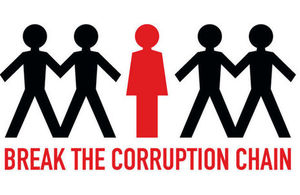Marking Anti Corruption Day 9th December
The 9th December is World Anti Corruption Day. Why does corruption matter?

Break the corruption chain
What is corruption?
No country is immune. Corruption is present in every society, and some will argue that it is part of every-day life, necessary to get things done. Corruption is defined as “the abuse of public office for private gain”. It erodes trust within societies, between businesses and between nations.
This diverts resources from where they are most needed, fuelling inequality and holding back social well-being.
Corruption also stifles economic growth and investment, and it increases the cost of doing business – increasing entry costs, deterring firms – particularly SMEs and entrepreneurs, who have fewer resources. Ultimately, this stifles innovation and creates a more uneven playing field.
The impact of corruption
Corruption undermines our prosperity by imposing a cost equivalent to 5% of global GDP (or $2.6 trillion –World Economic Forum) every year. It adds up to 25% of the cost of procurement contracts in developing countries.
The World Bank estimates that Bribery can add up to 10% to business costs globally.
The World Bank estimates that over US$ 1 trillion is paid in bribes each year. – so if the IMF estimates global growth to be only 3.25% this year, it is clear tackling corruption makes economic sense. Corruption also facilitates organised crime and terrorist activity.
What is the UK doing against corruption?
The Prime Minister committed to raising international standards on transparency at the G8 Summit in Lough Erne. HMG has since been working to deliver through the G7, G20, OECD, FATF, and United Nations and in the main international development organisations such as the World Bank, the IMF and regional development banks.
The UK has continued to co-sponsor the Business Anti-Corruption Portal along with Austria, Germany, Norway and Sweden, to help enable companies to adhere to the UN Global Compact Principle 10 on corruption.
Through our Presidency of the G8 last year, the UK secured a landmark agreement to promote tax transparency, tackle the misuse of ownership and legal arrangements by large companies, and announced plans for a UK register of beneficial ownership.
Conclusion
Over the past year, the G8 Summit, the UK Bribery Act and Open Government Partnership (OGP) have provided a strong platform to press for global change to promote transparency and for action against corruption. As Presidency of the G8 and lead co-chair, of the Open Government Partnership, we challenged and gained commitment from countries on open data, land, tax extractives, trade, beneficial ownership and governance.
The UK has taken a strong stance on bribery because we believe corruption is so harmful to economic growth and undermines the social fabric of societies.
In December, Transparency International published their 2013 Corruption Perceptions Index, which saw the UK rise up three places, reflecting the positive steps we have already taken.